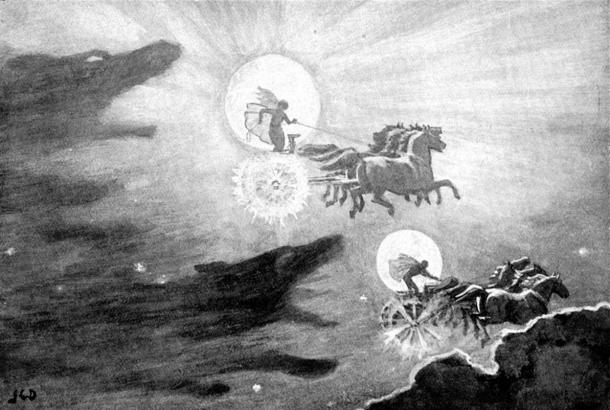
Friday is more than the first day of spring. There
will be a super moon and also a solar eclipse. The biggest eclipse since 1999,
it is expected to plunge some countries into 98 percent darkness, the event,
which corresponds with the March equinox, will “skirt the south of Iceland,
pass over the Faroe Islands and the Norwegian territory of Svalbard, and finish
over the North Pole” this Friday, according to NASA. Phases of the eclipse will
be visible from everywhere in Europe, most of northern Africa, western Asia and
parts of the Middle East. Saint
John’s in Newfoundland, Canada, will also see a small bit of the eclipse
at sunrise, but the rest of North America will
not be able to view it—this includes where I live. Might be able to view the
super moon as 100% rain to hot where I live is to end by noon (we shall see). As for
the first day of spring, it will be in the forties where I live too. More
winter than spring-like.
Are there myths about the solar eclipses? Let’s see.
This rare event is the moon passing directly between
the sun and the Earth—shadowing the planet. The event of midday twilight is
said to even quiet birds, as they stop singing, no doubt confused into thinking
night has arrived. This significant occurrence was seen as so traumatic or
‘unnatural’ to humanity since prehistoric times myths and legends, and many
reason myths and legends have sprung up.
The sun or moon being devoured by supernatural entities was a common theme in myths. Like those in Vietnam believed that a solar eclipse proved the sun was being eaten by a giant frog.

It was thought the sun disappeared due to attacks by gigantic hounds in Korea. Mythical fire dogs called Bulgae were sent by the lord of a dark realm to bite the sun and moon. But the sun was too hot and the moon too cold to bite, only a short time, and the injured dogs returned to their master without their prize.
An eclipse was caused by spirits of the dead trying to eat the Sun or Moon, at least so said Serrano natives of California. Shamans and ceremonial assistants sang and danced during an eclipse as a way to appease the dead. Everyone else shouted in hopes that the spirits would be frightened away.

The Vikings explained that sky wolves, or warsg were behind the eclipses, trying to chase and eat both sun and moon.
There is a legend about the Hindu demon Rahu, who attempted to sneak a taste of an elixir of immortality. The sun and moon told the god Vishnu about Rahu’s crime, so Vishnu sliced off Rahu’s head as the demon was drinking. Rahu’s head became immortal, though his body died. In rage and frustration, Rahu’s head continues to chase the sun and moon, occasionally catching up to swallow them. Because he has no body, however, the moon and sun disappear only momentarily, and fall out the bottom of his head.

There are different traditions and practices still
carried out by various cultures to ward off evil during an eclipse, or avoid
bad luck. Fasting is still recommended in some countries during solar eclipse. Children
and pregnant women are asked to remain indoors as the dramatic darkness is
believed to be a danger to them. Other traditions include banging pots, playing
drums, and making noise during eclipses in the attempt to scare off evil
forces, plus encourage a return of the proper cosmic alignment. In parts of
India, people fast during a solar eclipse because they believe that any food
cooked during the time will be poisonous, and in Italy it is believed that
flowers planted during a solar eclipse have more color than those planted at
other times of the year.
The West African Batammaliba’s legends tell that the
Sun and Moon are fighting and the reason for the eclipse. The only way to stop
the conflict was for people on Earth to settle their differences.
In reality, eclipses happen only happen at the new
moon, when the moon directly blocks sight of the sun from certain places in the
world. It can take place up to five times a year. But NASA says that only 25
years in the past 5,000 have had five solar eclipses.

3 comments:
How interesting! Thanks so much for sharing. I saw a video of how the supermoon and eclipse washed out Point St. Michel in France. Amazing!
Smiles
Steph
How interesting! Thanks so much for sharing. I saw a video of how the supermoon and eclipse washed out Point St. Michel in France. Amazing!
Smiles
Steph
You're welcome, Stephanie. :-)
Post a Comment